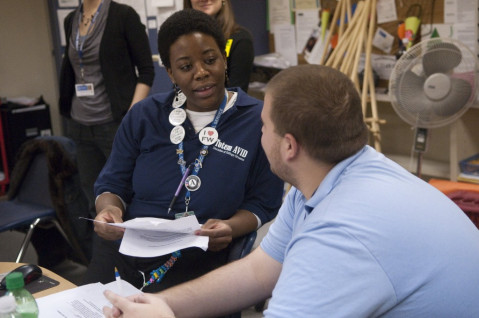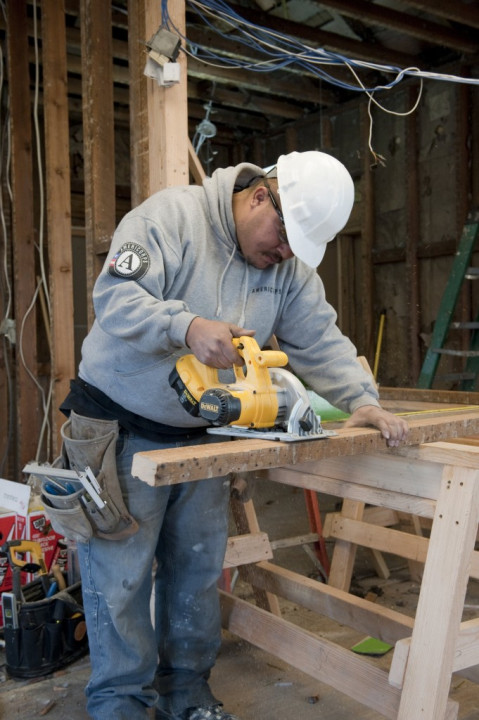Widgetized Section
Go to Admin » Appearance » Widgets » and move Gabfire Widget: Social into that MastheadOverlay zone
A Boost to AmeriCorps: Success of Stimulus in Washington State
This article is part of a Special
Section on “AFTER THE RECOVERY ACT: TRANSFORMATION OR BUSINESS AS USUAL?” that ran
in the November/December 2010 print issue of PA TIMES. Contact Editor
Christine Jewett McCrehin ([email protected]) for more information on
the print issue. See the Related Articles box for links to read more from the Special Section.
Mary Van Verst, Debbie Schuffenhauer
Using service as a strategy to support those affected by the nation’s economic crunch isn’t exactly a revolutionary concept. In 1933, America was in the grip of the Great Depression. More than 25 percent of the population was unemployed, hungry and without hope. Out of this economic chaos emerged the Civilian Conservation Corps (CCC). Its purpose was two-fold–to preserve our natural resources and to offer work to Americans in a time of great instability. But more importantly, it offered citizens the chance to improve the nation’s future, while strengthening their own dignity.
The spirit of the CCC lived on in 2009 when Congress authorized American Recovery and Reinvestment Act (ARRA) dollars to the Corporation for National and Community Service to deploy more than 15,000 AmeriCorps members. Members provided vital services to people and communities in need and helped to strengthen the capacity of nonprofits and social service organizations to meet the increased demand for services. Just like when the CCC was created more than 75 years ago, service was considered a viable strategy to keep citizens engaged during this economic downturn.
In Washington State, the Recovery Act provided approximately $3.5 million to support 284 AmeriCorps members. Members offered job counseling and placement services; provided foreclosure prevention and financial counseling; weatherized homes; strengthened food banks; supported health care and independent living services; and provided other assistance to people facing unemployment, poverty, or other economic challenges.
One of the programs aided by the stimulus funding was the Advancement Via Individual Determination (AVID) program. A 20-member team in Federal Way, Washington, served as tutors and coaches for students without a college-going tradition in their families. AmeriCorps members helped students meet college eligibility requirements, and helped level the playing field for minority and low-income students. AVID has proven to be a successful approach and these members expanded its reach to give many at-risk students the chance to succeed in life and obtain viable employment.
“My motto is to be the change behind the change,” said Sarah Swihart, a three-term AmeriCorps alum who served with the AVID program at the middle and high school levels. “I was able to see the whole process of AVID, with kids who were getting excited about college, going through the scholarship process, ‘upping’ their own expectations.” In many ways, Swihart went through this process along with the students she coached. Her own story included dropping out of high school as a sophomore, getting a GED at 19, and an associates degree from a community college. But Swihart said she wasn’t ready to complete college. She admits that she didn’t know how to study, plus “something in my life was missing.” She heard about AmeriCorps from a friend and applied to the AmeriCorps program in Federal Way.
In 2007, Swihart tutored children in an elementary school. She knew her journey was just beginning. She elected to do a second year of AmeriCorps in 2008 with the AVID program in a middle school. “It was a tough class. They were very naughty,” Swihart said with a chuckle. But through team-building exercises, and building relationships with the students, she noticed that she and the other AmeriCorps members were getting to the hearts of the students. In 2009 Swihart was selected to serve a third year as an AmeriCorps*VISTA volunteer. By this time, she was deeply committed to helping her students succeed. “In their lives they’ve had a lot of people let them down.” Swihart and her AmeriCorps colleagues made sure that the students would feel fully supported. She worked with seventeen students, thirteen of whom went to college after graduating. Many received full scholarships. Swihart recounted how she and the students worked for hours on essays, financial aid information and forms. “We even visited a community college, and the students were blown away!” Swihart said that they also explored other options besides college, and some of the students chose to join AmeriCorps.
Swihart is now fully enrolled at Seattle University studying public affairs and government policy. In two year she hopes to enter an accelerated Master’s program in public affairs. She also serves as the Leadership Coordinator in the university’s Leadership Development Office. Swihart remarked, “My AmeriCorps experience got me here. I want to be a positive leader in my community.”
A primary success of the Recovery Act in Washington State was a large majority of target outcomes that were met and exceeded by the AmeriCorps programs with ARRA funding. Among these outcomes were: 8,839 hours of tutoring and literacy services provided; 21,756 clients receiving information on health insurance, health care access and health benefits programs; 722 clients receiving services related to financial literacy; 934 clients receiving employment skills training and counseling; 10,833 clients receiving housing rehabilitation, weatherization and efficient-energy services; and 3,221 existing homes and structures rehabilitated, weatherized, or made more energy-efficient.
A major theme coming from the ARRA Recovery process was that it led to many AmeriCorps members finding jobs after their term of service, and sometimes being hired by sites where they served. From the many stories submitted by ARRA programs, it is not easy to describe or measure the number of individual lives touched by the ARRA grants in its yearlong existence. Among the ARRA AmeriCorps members, many had been unemployed or laid off workers, veterans including many with disabilities, recent college grads, and others who made a tremendous difference in their communities during the time that they served. We get to the heart of the impact with stories like that of Sarah Swihart, above, and this next story of Gary Gray.
In August 2008, Gary Gray found himself in a position he never thought he’d be in–homeless–due to the economic conditions facing his community and the country. He remained homeless for nine months. In May of 2009, his life began to change. Gray received services from the Senior Community Service Employment Program, which led him to the Longview Housing Authority (LHA). The organization eventually became the host site for his AmeriCorps position (created with ARRA funding).
Gray enrolled as a full-time AmeriCorps member on June 1, 2009. The LHA felt that Gray’s veteran status and first-hand experience with homelessness made him an ideal candidate to provide services to the increased number of homeless veterans. Among Gray’s many responsibilities were to conduct outreach to homeless veterans and inform them of the available housing programs; assist unemployed veterans with job readiness and work search through the Vet Works program; and help connect veterans with services available through the Veterans Administration.
As part of his outreach activities, Gray encouraged other veterans to volunteer.
“Serving alongside others is a great way to connect to the community. It’s good for the soul and your self-worth. Being idle doesn’t help you move forward in life. I was embarrassed to be homeless, but the AmeriCorps experience awakened me and made me a better person; a more engaged citizen; it turned my life around.
ASPA Member Mary Van Verst is program development and evaluation coordinator for the Washington Commission for National & Community Service. Email: [email protected]
Debbie Schuffenhauer is the associate director for the Washington Commission for National & Community Service. Email: [email protected]







Follow Us!